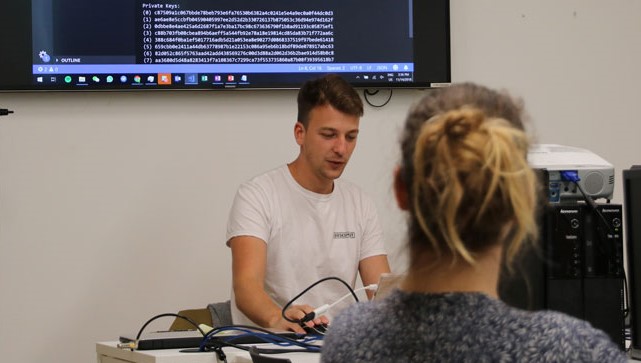Argentinian-born, 29 year-old developer Alejandro Banzas is on a mission to “help every developer and organization becoming experts in new technologies in order to change the world positively”. And as one of the world’s leading experts in blockchain and smart contract technology, he certainly has the skills – and the air miles – to do this.
After graduating from a degree in Computer Science Engineering in 2014, Alejandro started to help NGOs and startups transform their systems using the latest technologies. He then went on to form part of Microsoft’s influential Innovation & New Tech Team, Argentina, Chile and Uruguay regions and he is currently the RNS Product Owner at knowledge-sharing platform IOV Labs (RSK Smart Contracts & RIF OS).
Alejandro is in Gibraltar in early May and June this year to deliver a specialist blockchain programme at the University of Gibraltar. We managed to catch him before he boarded a flight to New York to ask him more about Buenos Aires, Blockchain and balancing travels with work.

Buenos Aires is often cited as an early adopter/ hub for blockchain and new technologies – are there any parallels with Gibraltar?
Buenos Aires is well known for being a hub for new technologies and blockchain is not the exception. The Bitcoin Argentina ONG was founded to integrate and growth the Bitcoin community in Buenos Aires first, and now not only in Argentina but in Latin America. Initiatives like the Latin American Bitcoin conference (laBITconf) are key for building ecosystem, integrations, use-cases.
Gibraltar has been building an environment to incentivize international startups bringing innovation to the country with regulation and vision. LATAM has room for improvement from the regulatory perspective, and we see every bridge between Gibraltar and LATAM a great opportunity to make it real.
What is it about blockchain that makes it so attractive to the financial industry?
Open decentralised Blockchains form the foundation for a new financial system with extremely low transaction fees and no account maintenance costs. On top of that enables the creation of risk assessment models based on reputational profiles much like what Uber, Airbnb & eBay did for other industries. When you combine all that you have the perfect platform to enable financial inclusion on a global scale and build the financial system of the future.
Can you tell me a bit about the Blockchain course you’re running with University of Gibraltar?
One of the biggest challenges in the whole tech industry (including fintech), is education. It is the path to the adoption of any new technology like blockchain. As part of the commitment between RSK and the Government of Gibraltar in education, we’ve been delivering workshops, training and talks during the last year mostly for beginners and teachers. Partnering with the University of Gibraltar is allowing us to open up the opportunity to upskill their graduates and participants of previous activities, in order to build local capacity and knowledge within blockchain.
We are delivering a 48-hour course divided in 2 blocks of 3 days each, very connected with real use-cases and the various industries including of course financial service applications. Our aim is having students building the next real blockchain use-case that transforms Gibraltar coming out from this course.
You travel A LOT – what tools do you use to make sure you’re still productive while travelling?
Last year I took almost 70 flights on 8 roadshows around Asia, Europe, Latam and US. I try to take advantage of every taxi drive, layover, day flight and dead time to catch up on emails, whatsapp, telegram. As a former Microsoft employee, I cannot detach myself from some their tools to have emails and notes everywhere and offline. And, last thing, an international SIM card, I cannot be offline for much time. Can you?
The University of Gibraltar’s Professional Certificate of Competence in Blockchain and Smart Contracts starts in May. Find out more.





